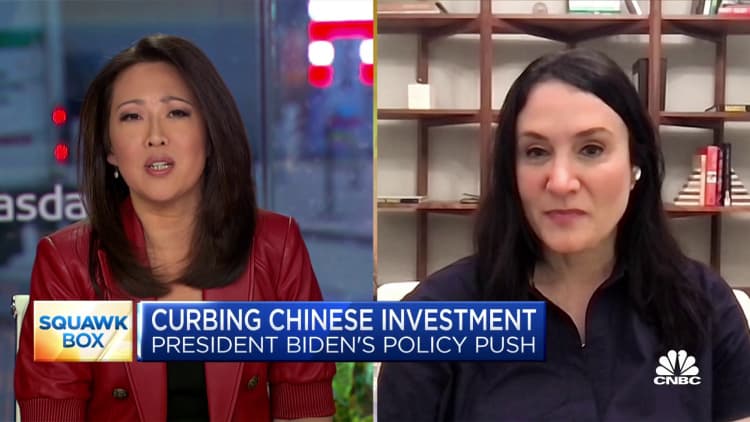Biden executive order on Chinese A.I. investments marks a ‘new era’

US President Joe Biden speaks on how “Bidenomics” is helping clean energy and manufacturing, at Arcosa Wind Towers in Belen, New Mexico, on August 9, 2023.
Jim Watson | AFP | Getty Images
The Biden administration’s executive order restricting U.S. private equity and venture capital investments in Chinese technology finally landed on Wednesday. For U.S. tech investors who’d already grown wary of the budding cross-Pacific rivalry, the ruling is the clearest signal yet that the world’s second-biggest economy is off limits.
Biden is specifically targeting investments in technologies like semiconductors, quantum computing and artificial intelligence on concern that China’s advancements in those areas run counter to U.S. national security interests. The new measure is expected to go into effect next year.
U.S. investors have been steadily retreating from China due to a combination of a weakening economy and the fraught geopolitical environment. Combined U.S. private equity and venture investments in China fell to an eight-year low in 2022 in terms of capital deployed, a trend that continued into the first half of this year, according to PitchBook data.
“We’ve had conversations with with our own clients who have said, ‘Yeah, look, we’ve really been pulling back on on our presence in China for a little while,'” said Elena McGovern, co-head of the national security practice at private equity advisory firm Capstone, in an interview. “This is the first time that the U.S. government is imposing restrictions on how U.S. capital flows out of the country, how U.S. investors are making investment decisions. So that is a new era.”
Political pressure has been bipartisan. Last month, the House Select Committee on the Chinese Communist Party sent letters to four U.S. venture firms, expressing “serious concern” about their investments in Chinese tech startups. And in July, legendary VC firm Sequoia Capital said it would split its international business into three parts, with Neil Shen helming its powerful Sequoia China unit.
At this point, any technology that can be used to enhanced China’s military strength or surveillance capabilities is of notable concern to the White House.
“U.S. money should not be used to finance Beijing’s military development,” said Eric Reiner, managing partner at Vine Ventures, which backs early-stage companies in the U.S., Israel and Latin America. “A lot of these firms that have been investing in China and setting up offices there are really playing with fire.”
While AI, computer processors, and quantum computing are areas of stated concern, many investors and experts say they have to move forward with the expectation that the ban will widen, essentially making any deal in Chinese technology too risky to pursue.
“It’s likely to deter investments in those sectors, even beyond what is explicitly prohibited,” said, Adam Hickey, a former deputy assistant attorney general for the Justice Department’s national security division who’s now a partner at law firm Mayer Brown. “Most investors want to avoid being seen as acting against U.S. national security interests.”
Steve Sarracino, the founder of Activant Capital, said “I don’t know anyone that’s doing early-stage China investing from from the U.S.” The only exception, he said, were “hedge funds, who really are in the business of calculating geopolitical risks.” Activant has offices in the U.S., Germany and South Africa.
The U.S. government’s ongoing hostility towards China carries its own risks. For one, there’s a ton of investment money in and around China that can fill the vacuum and potentially generate huge returns. There’s also the challenge of dealing with existing investments.
For example, major U.S. venture firms have invested in ByteDance, the parent of mobile video app TikTok, which has faced the threat of a potential ban in the U.S. or a forced sale to keep operating. Investors want to maximize their returns, which could be huge should ByteDance go public.
TikTok CEO Shou Zi Chew testifies before the House Energy and Commerce Committee hearing on “TikTok: How Congress Can Safeguard American Data Privacy and Protect Children from Online Harms,” on Capitol Hill, March 23, 2023, in Washington, DC.
Olivier Douliery | Afp | Getty Images
ByteDance reportedly scrapped a planned U.S. listing in 2021 after the company learned it needed to deal with potential security concerns. That same year, China cracked down on domestic companies that traded on U.S. exchanges. With the tech IPO markets still largely closed and U.S.-China tension only building, it’s not clear when or how ByteDance investors will realize their gains.
Other investors worry that if relations eventually improve between the two countries, U.S. firms will be at a disadvantage when it comes to finding and getting into deals. Rebuilding trust will likely be a particular challenge.
“If you already had a presence there, you will have an advantage when things open up,” Sarracino said. But that’s not the case for firms that weren’t in China or those that pared back their operations in the country, he said.
Reiner says the investment returns that could be generated from Chinese companies aren’t worth the global threat posed by having China own and control sensitive technologies.
“I wonder if the executive order itself is even really necessary,” he said, “or if we really should be spending our time securing our resources and incentivizing China not to spy on our important and proprietary technology.”
WATCH: Biden doesn’t want U.S. dollars funding China’s military





